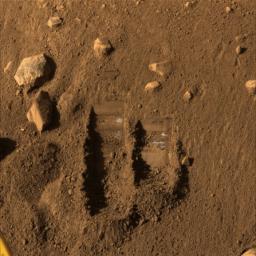
|
Color View ‘Dodo’ and ‘Baby Bear’ Trenches
- Click the image above for a larger view
- Full-Res JPEG (1024 x 1024) (241.2 kB)
- Full-Res TIFF (1024 x 1024) (3.1 MB)
Caption:
NASA's Phoenix Mars Lander's Surface Stereo Imager took this image on Sol 14 (June 8, 2008), the 14th Martian day after landing. It shows two trenches dug by Phoenix's Robotic Arm.
Soil from the right trench, informally called "Baby Bear," was delivered to Phoenix's Thermal and Evolved-Gas Analyzer, or TEGA, on Sol 12 (June 6). The following several sols included repeated attempts to shake the screen over TEGA's oven number 4 to get fine soil particles through the screen and into the oven for analysis.
The trench on the left is informally called "Dodo" and was dug as a test.
Each of the trenches is about 9 centimeters (3 inches) wide. This view is presented in approximately true color by combining separate exposures taken through different filters of the Surface Stereo Imager.
Background Info:
The Phoenix Mission is led by the University of Arizona, Tucson, on behalf of NASA. Project management of the mission is by NASA's Jet Propulsion Laboratory, Pasadena, Calif. Spacecraft development is by Lockheed Martin Space Systems, Denver.
Photojournal Note: As planned, the Phoenix lander, which landed May 25, 2008 23:53 UTC, ended communications in November 2008, about six months after landing, when its solar panels ceased operating in the dark Martian winter.
Cataloging Keywords:
| Name | Value | Additional Values |
|---|---|---|
| Target | Mars | |
| System | ||
| Target Type | Planet | |
| Mission | Phoenix | |
| Instrument Host | Phoenix Lander | |
| Host Type | Lander | |
| Instrument | Solid-State Imaging (SSI) | |
| Detector | ||
| Extra Keywords | Color, Thermal | |
| Acquisition Date | ||
| Release Date | 2008-06-11 | |
| Date in Caption | 2008-06-08 | |
| Image Credit | NASA/JPL-Caltech/University of Arizona/Texas A&M University | |
| Source | photojournal.jpl.nasa.gov/catalog/PIA10785 | |
| Identifier | PIA10785 | |
